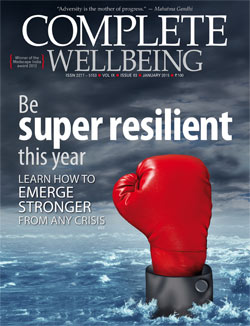
Staying Power
Nicolo Paganini, a celebrated Italian violinist, was performing to a full house one evening. Towards the end of the concert, even as Paganini was thrilling the audience with one of his breathtaking compositions, one of the strings on his violin snapped. Not the one to be perturbed, Paganini ignored the now limp string and continued to play as if nothing had happened. Soon, a second string came off, which was followed by a third. The musician stood there with three strings dangling from his violin, even as the audience gasped. But instead of leaving the stage apologetically, he remained unfazed and calmly went ahead with his performance, completing it on the one remaining string. Paganini was resilient.
Resilience is the ability to face and overcome adversity gracefully, even using it as an opportunity for self-growth. It requires courage, patience and an attitude of standing firm during an unexpected crisis. When I think of resilience, I remember the many survivors who have made it through unexpected hardships, some of them surviving nearly impossible conditions, to become examples for the rest of us.
What is it that enables people to face unexpected setbacks—an unexpected financial loss, a painful heartbreak, a serious illness? What makes people come out triumphant in the face of the most trying circumstances? It’s their capacity to shift gears, to move from automatic reactivity to more flexible responsiveness, says Linda Graham. An experienced psychotherapist and author of the award-winning book Bouncing Back: Rewiring Your Brain for Maximum Resilience and Wellbeing, Linda combines modern neuroscience, mindfulness practices, and relational psychology to teach people skills that help them to become more resilient.
Yes, resilience can be learned—and it’s not very difficult as Linda proves in this month’s cover story. “Skills needed to bounce back from adversity can be learned; resilience can be strengthened in the moment, over time, eventually becoming a way of being,” she writes as she shares real life examples to explain how we can cultivate a resilient mindset. The experiential tools she offers are so simple to use, you can test them right away. In their simplicity lies the power of effectiveness—you can use them anywhere, anytime, especially once you learn that your brain literally rewires itself at your command.
Finally, when staring at an adverse situation, the words of Helen Keller might give you the strength you need to transcend it. She said: “Although the world is full of suffering, it is full also of the overcoming of it.” She knows; she is among the most resilient humans ever born.
Read the full story here.

